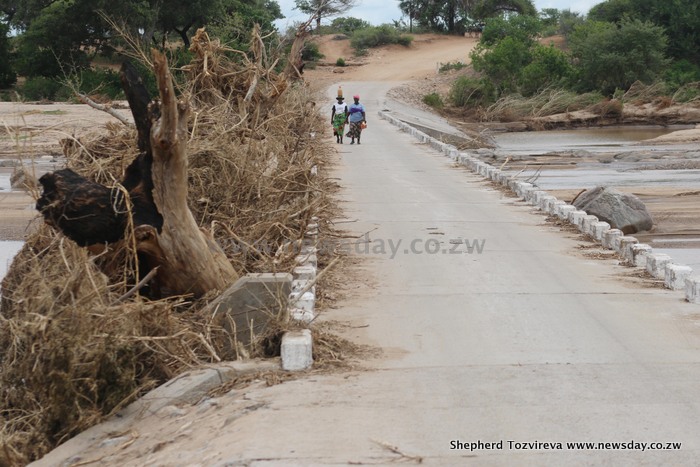
A VIOLENT wave of floods and incessant rains that swept across the low-lying lands of our country, for a number of months, did not only come as a blessing in boosting the water table, but also came as an agent of destruction and plunder.
guest column: Peter Makwanya
The rains were so unique. Not only were they good for command agriculture, but they also commanded people out of their homes, destroyed their property, livestock and, sadly, lives were lost in the process.
As a result, people were internally displaced and, as we speak, they are climate refugees in their own country.
Every low-lying area of Zimbabwe witnessed more than its brutal share of floods, but special reference goes to the people of Tsholotsho, who bore the vicious brunt of this natural phenomenon.
Accordingly, the government has declared this state of affairs a “national disaster” and appealed to the international community to assist.
Ironically, that is when the government finally remembered the critical role played by the international non-governmental organisations.
For the first time in as many years, the authorities appeared to have come down their high horses and used a conciliatory tone to plead with the international community to provide the most needed assistance.
- Chamisa under fire over US$120K donation
- Mavhunga puts DeMbare into Chibuku quarterfinals
- Pension funds bet on Cabora Bassa oilfields
- Councils defy govt fire tender directive
Keep Reading
The displaced people of Tsholotsho are in a crisis and on a tipping point too.
As such, flood victims not only require blankets, food handouts, temporary shelter, medicines, financial resources, clothes, and learning materials for their children, they also need counselling, a critical pillar for rehabilitating traumatised people.
The flood victims had their assets washed away and destroyed by violent floods, compounded by the loss of lives.
Therefore, they need re-intergration and appropriate rehabilitation, not linguistic games or political Tomfoolery and grandstanding. In short, they need a real deal, not communication massaging.
These flood victims have been psychologically and emotionally haunted by the sudden change in their individual life situations. In this regard, they are more insecure and vulnerable than ever before.
Now they find themselves in unfamiliar trenches and makeshift shelter, posing serious health challenges, which, if not decisively attended to, would contribute to a human catastrophe.
As the situation stands, children have been forced out of school and now they wait for agents of help to erect tents as temporary classrooms or they make do with the available tree shades, to complete their horror cycle.
They also need reading and writing materials. All in all, they need everything possible.
The effects of these floods will have permanent imprints in the minds of the victims. That is why they needed rehabilitation, yesterday.
In one of my weekly articles, I questioned the country’s readiness and preparedness in the event of natural disasters striking.
Of course, it was taken as one of those loud circumstances, but now the authorities have been caught napping and shamely exposed too, yet another Chingwizi was repeating itself and authorities seemed not to have learnt anything at all.
Now comes the Tsholotsho tipping point which has presented the government with a rude awakening and the officials are now in a state of panic, saying things that they never in any other day imagined themselves uttering, pleading with the international community, whom they have always accused of being agents of the regime change agenda.
Of course, natural disasters are unavoidable, but it is every country’s state of preparedness which matters most.
Natural disasters have taken place in countries like Japan and even the United States, but they have resources at their disposal and they always plan for these tsunamis.
And what do we have as a country?
We have sporadic and piece-meal interventions that never changed the prevailing state of affairs.
Of course, some rescue efforts were undertaken here and there, but I wonder if indeed they were timely enough.
More than 200 people succumbed to the overwhelming tidal force. But can we really afford a situation where more people are going to die?
This becomes a double tragedy for survivors, some of whom lost property, livestock as well as family members and relatives.
These are the people who not only need material interventions, but psychological ones too. They need rehabilitation and they need counselling most.
Counselling should be able to deal with post-traumatic disorders, which are normally in the form of anxiety, depression and sometimes memory loss.
Disjointed and splintered efforts will not bring favourable results.
We need an integrated approach that is holistic both in scope and practice.
Of course, reconstruction is going to be painful, but moving towards that direction will bring hope and certainty to the victims concerned.
Political will and commitment is quite fundamental while relocation depends on two factors.
Having identified the relocation place, recording what was lost and carrying out some needs analysis to avoid pitfalls of coming up with loose measures.
Some of the affected people have a split-personality syndrome in that they have lost everything, but their hearts still lie in the affected areas. Others would even want to go back while another fraction would want to move on.
That is when counselling becomes handy in trying to provide the affected people with opportunities to choose from so as to start a new life and a new beginning.
Peter Makwanya is a climate change communicator. He writes in his own capacity and can be contacted on: [email protected]











